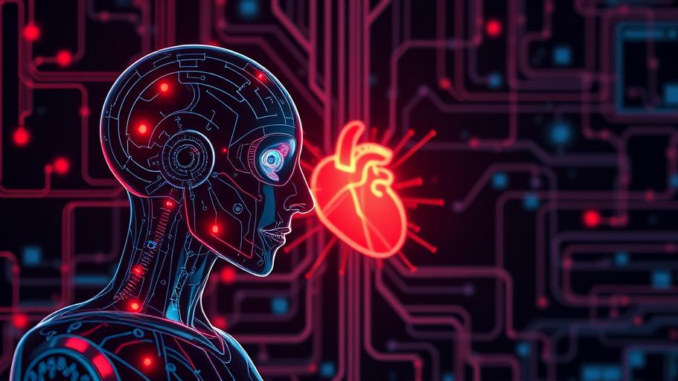
Summary
This article explores the groundbreaking use of AI and wearable sensors in detecting heart disease, particularly hypertrophic cardiomyopathy (HCM). It discusses the potential of this technology to provide early diagnosis, improve patient outcomes, and revolutionize cardiovascular healthcare. The article also highlights the limitations of current research and emphasizes the need for larger-scale studies to validate the effectiveness of this approach.
See how TrueNAS offers real-time support for healthcare data managers.
** Main Story**
Heart disease is still a leading killer globally. So, naturally, we need better ways to spot it early. Fortunately, researchers are making strides by combining artificial intelligence (AI) with wearable sensors. The goal? To detect heart problems earlier and more effectively, and that means folks get treatment when it really matters. One particularly cool development? It’s an AI system that can detect hypertrophic cardiomyopathy (HCM) using data from a wrist-worn sensor.
Early Detection is Key with HCM
HCM, or hypertrophic cardiomyopathy, it’s tricky. Often, it goes undiagnosed, and if it’s not caught, it can lead to serious issues. This new AI system uses something called photoplethysmography (PPG). It’s a non-invasive way to measure changes in blood volume near the skin’s surface. You know, that thing your smartwatch uses to measure your heart rate? Yeah, that’s the one! It’s a pretty convenient platform for screening. So it’s readily available, and could really, really help to screen for HCM.
How Does This AI System Actually Work?
Basically, the AI works alongside a wrist-worn device. Think of it as a souped-up smartwatch – it’s got a clinical-grade PPG sensor, an accelerometer, and a gyroscope. This device collects data that’s unique to folks with HCM. The AI then analyzes this data to figure out who has obstructive HCM (oHCM) and who’s healthy. And get this: in a recent study, the system was spot on about 95% of the time in identifying oHCM patients and 98% accurate in classifying healthy people. Not bad, right?
What Does This Mean for Heart Health?
This successful use of AI and wearables to detect oHCM is a huge step forward, I think. I remember when I was younger my father had a similar condition, and he had to have weekly tests at the hospital to monitor his condition. What if this technology existed back then? Because so many people have smartwatches with PPG, this AI approach could become a super accessible way to find undiagnosed HCM, enabling earlier treatment and potentially saving lives.
Looking Ahead: What’s Next?
Okay, so the initial results are awesome. That said, the researchers are the first to admit there’s a snag. The study size was small. To really validate these findings, we need larger studies with more diverse groups. This will help us see how things like age, gender, and other health issues affect the AI’s accuracy. Plus, future studies should explore using this tech for other types of heart disease. And what about continuous monitoring and personalized treatment plans? The potential is massive, if you ask me.
AI Beyond Heart Disease
But it’s not just heart disease, AI is shaking things up across medicine. For example, AI tools are improving how we analyze medical images, which is leading to earlier and more accurate diagnoses for conditions like breast cancer and diabetic retinopathy. Plus, AI algorithms are helping doctors make better decisions by quickly providing access to relevant info and research. I mean, who wouldn’t want a super-smart assistant like that?
Making Healthcare Easier to Access
AI is also helping make healthcare more accessible and efficient. AI-driven chatbots and virtual assistants can offer 24/7 patient support, improving engagement and helping patients stick to their treatment plans. On the administrative side, AI is streamlining things like scheduling, billing, and electronic health records. This frees up healthcare pros to focus on what really matters: taking care of patients.
Accelerating Scientific Breakthroughs
Another thing, AI is speeding up scientific discovery, especially in drug development. By predicting how drugs will interact and what the outcomes will be, AI is cutting down the time and cost of clinical trials. This means we can develop safe and effective medications faster. Not only that but AI is also being used in public health to predict disease outbreaks, which enables more targeted interventions.
Challenges and Ethical Considerations to Keep in Mind
Of course, while AI in healthcare has incredible potential, there are challenges and ethical considerations. Securing patient data and protecting their privacy is vital. AI systems rely on tons of patient data, so we’ve got to make sure it’s safe. Also, we need to address potential biases in algorithms and make sure everyone has equal access to AI-powered healthcare. It’s all about fairness and responsibility.
The Future is Here
Looking ahead, AI is set to revolutionize healthcare. As the tech gets better, AI-powered tools will become more sophisticated and integrated into everyday care. This will empower healthcare professionals and improve patient outcomes. We just need continued research, collaboration, and responsible implementation to unlock the full potential of AI for the sake of global health. It’s an exciting time, and I’m eager to see what the future holds!


A “souped-up smartwatch” fighting heart disease?! I’m waiting for the action movie adaptation. Forget “Fantastic Voyage”, we’ll have “Incredible Implantables”! I wonder if it gives pep talks, like “Don’t worry, aorta, I’ve got this!”. Seriously though, amazing potential, let’s hope the larger studies deliver.
Incredible Implantables – I love it! That’s definitely a better title than I came up with! Imagine the possibilities beyond heart pep talks – maybe it can coach you through a workout too. Let’s hope those larger studies bring us closer to that reality!
Editor: MedTechNews.Uk
Thank you to our Sponsor Esdebe
The use of AI to analyze medical images is a particularly exciting development. Early and accurate diagnoses for conditions like diabetic retinopathy can significantly improve patient outcomes. Expanding AI applications in this area could transform preventative care.